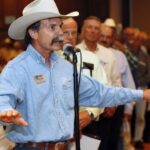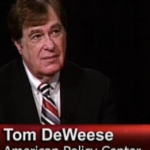by Richard Oswald – 1/31/2010
 Year in and year out, things here stay pretty much the same. We still have death and taxes. The sun rises in the east and sets in the west, and the North Star is always perfectly positioned above the neighbor’s barn.
Year in and year out, things here stay pretty much the same. We still have death and taxes. The sun rises in the east and sets in the west, and the North Star is always perfectly positioned above the neighbor’s barn.
But on rare occasions the finer aspects of nature (and people) become a bit less predictable.
The year ended in Langdon the same way it did in the rest of North America, with a Blue Moon. (That’s a full moon at both the beginning and the end of the month.)
It was that kind of year from start to finish. We had a late spring, an unusually cool growing season, rainfall that was nearly double the normal amount, an earthquake, and a difficult harvest followed by blizzards throughout December — all stuff that only happens once in a Blue Moon.
 Once in a blue moon folks like me get to thinking that some of the out-of-whack things in America might somehow be getting better for our food — and the people who raise it.
Once in a blue moon folks like me get to thinking that some of the out-of-whack things in America might somehow be getting better for our food — and the people who raise it.
The pork checkoff election
A few years back a lot of us were giving high fives when U.S. Agriculture Secretary Dan Glickman took the unusual step of allowing pork producers to decide whether or not to keep the pork check-off — a mandatory fee paid into a marketing fund each time a hog is sold.
 A majority of pork producers voted to repeal the check-off rather than continue funding the agenda of big pork processing corporations. That’s because packers and their best buddies had camouflaged themselves to look like producers instead of end-users.
A majority of pork producers voted to repeal the check-off rather than continue funding the agenda of big pork processing corporations. That’s because packers and their best buddies had camouflaged themselves to look like producers instead of end-users.
Small producers were being sold down the river by big agribusiness.
Hog growers were working under contracts with the packers that were harsh and difficult to enforce. Hog raisers couldn’t find reliable markets, and those who tried to compete on their own with the big packers were giving up and leaving the farm in droves.
The revolt against the pork checkoff was one of those blue moon moments.
Glickman answered the will of the farmer, approved a referendum on the check-off, and when a vast majority of producers voted to end it, he certified the results. The check-off tax was dead.
Unfortunately, Glickman left town with the rest of the Clinton administration before the results of the referendum could be enacted. His Bush administration successor, Anne Veneman, set the election results aside, telling producers their voluntarily-funded checkoff project had now essentially become a mandatory federal tax.
For the most part we don’t get to vote on taxes in America. We only get to vote on the people in Congress who establish them. The pork check-off was different. It was voted in by the people who would pay it, and the same people voted it out (until Sec. Veneman intervened).
Sometimes the government just doesn’t seem to hear us very well. It happens over and over.
Mad cow disease
For example, U.S. beef producers wanted to certify their own beef as BSE (Mad Cow Disease) free. It seemed a reasonable request, since we were losing business outside the U.S. because other countries feared that they were importing BSE meat. But the big packers didn’t want that label because it would have allowed small producers to gain an advantage in exports, a coveted retail market.
Even though U.S. producers such as Creekstone Farms and Gateway Beef were going to test for BSE in every animal they sold, the U.S. Department of Agriculture said that only the government could test for BSE.
Of course, BSE didn’t come from U.S. beef, but from imports from Canada or Great Britain. The big meat packers didn’t want that to be accepted knowledge because beef imported from Canada and elsewhere can be a cheap source of profit.
Once in a blue moon things change, and “change” was the promise of the Obama campaign in 2008.
Things are definitely looking up, but change is easier to talk about than accomplish. When Mother Nature wants modification to the status quo she lets the chips fall where they may. When man alters things, he too often seeks a consensus of major players: titans of industry, bankers, ranking politicians, and the wealthy. They all want to be in the room together.
Guys like me are generally on the outside looking in, supplying at cost the pure basic commodities big business adulterates for profit.
National animal identification
That brings us to the National Animal Identification System.
The NAIS would require each farm animal to be tagged with a computer chip. Grassroots producers fought against mandatory animal ID throughout most of the Bush years. When President Obama was elected. there was celebration by farm groups because we thought NAIS was finally dead. Or was it?
Producers realized that NAIS ignored the real issues of food safety by putting small family farms at a disadvantage with big agribusiness. Under the NAIS proposal, a farmer with 50 cows and calves on pasture would have to tag all 100 animals.
But a feeder packer with a dozen 10,000 hog confinement buildings only had to report 12 numbers, one for each building. All that information was to be stored in a privately-operated database outside USDA with only “insiders” having access to the records.
NAIS never made sense. Virtually all food safety and pollution problems stem from imperfect processing and imported animals and food products (such as beef scraps from Uruguay), but the government was in effect saying small producers were mostly to blame. After all, NAIS was holding us to higher standards than the real food safety offenders. Animal ID was a way for corporations to shift the blame for their mistakes to farmers who had no control over what happened once their animals left the farm.
Producers geared up to fight NAIS the best they could by attending USDA listening sessions to testify against animal ID. Even when the testimony was overwhelmingly against NAIS, the USDA continued to move ahead with plans for implementation until some in Congress, like Sen. Jon Tester of Montana, were successful in cutting funding to the program.
Tester is a farmer, rancher and livestock owner who is also a U.S. Senator.
If money is the source of all evil, we definitely pulled NAIS up by the roots, persuading the House of Representatives to eliminate funds and the Senate to at least radically curtail them.
Or so we thought. Today, even with funding cut, government and corporate insiders are still talking about NAIS, waiting for their chance to bring it back to life.
I’ve heard that as our nation grows, we must all be willing to give up some of our rights for the good of all. I would agree that’s true when it comes to traffic lights or airport screening.
But food?
Big seed
These days it’s not too unusual for seed companies to sue each other. Lately a single seed company has gotten big enough to control 98 percent of the soybean seed market and 79 percent of corn.
The last time a single entity controlled that much seed was when Adam walked alone in the Garden.
That company, Monsanto, says it needs single-handed control and big profits to enable farmers to feed the hungry. Some farmers reply that all we really need to do our job is freedom of choice to buy seed without fear of economic retribution.
In a rare and uncommon turn of events, the Department of Justice has decided to investigate whether Monsanto’s unusual control of seed markets violates federal antitrust laws.
The last time the U.S. cracked down on this much corporate power was when Teddy Roosevelt played trustbuster 100 years back. That was many moons ago.
It used to be that rulemaking took place in the light of day.
For Americans, sightless regulators blinded by power have been a big problem in agriculture, banking, Wall Street, the futures markets, healthcare, energy… you name it.
But once in awhile, like now, if the problem is big enough, a little light from a Blue Moon is what is needed to start setting things right.
Richard Oswald farms and writes from his home near Langdon, Mo. His column regularly appears at www.dailyyonder.com. Reprinted with permission.
The North Platte Bulletin – Published 1/31/2010
Copyright (c) 2010 northplattebulletin.com – All rights reserved.
Flatrock Publishing, Inc. – 1300 E 4th St., Suite F – North Platte, NE 69101

Copyright (c) 2003 – 2010 northplattebulletin.com
All rights reserved. Flatrock Publishing, Inc.
1300 E 4th St., Suite F
North Platte, NE 69101



